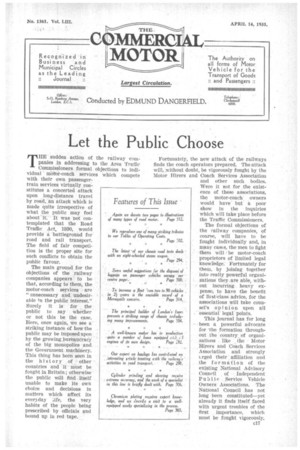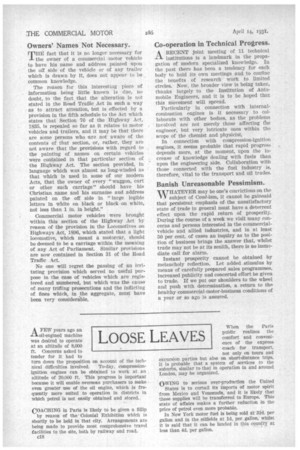Let the Public Choose T HE sudden action of the railway
Page 39

Page 40

If you've noticed an error in this article please click here to report it so we can fix it.
'companies in addressing to the Area Traffic Commissioners formal objections to In motor-coach services which compete with their own passenger: train services virtually con stitutes a concerted attack upon long-distance travel by road„ an attack which is made quite irrespective of what the public may feel about' it. It was not contemplated that the Road Traffic Act, 1930, would provide a 'battleground for road and rail transport. The field of fair competition is the proper site for such conflicts to obtain the public favour.
The main ground for the objections of the railway companies appears to be that, according to them, the motor-coach services are "unnecessary and undesirable in the public interest." Surely it is for the public to say whether or not this he the case. Here, once again, we see astriking instance of how the public may be imposed upon by the growing _bureaucracy of the big monopolies and the Government machinery. This thing has been seen in the history of : other countries and it must be fought in Britain; otherwise the public will find itself unable to make its own choice and decisions in matters which affect its everyday life, the very habits of the people being prescribed by officials and bound up in red tape. Fortunately, the new attack of the railways finds the coach operators prepared. The attack will, :without doubt, be vigorously fought by the Motor Hirers and Coach Services Association and other such bodies.
Were it not for the existence of these associations, the motor-coach owners would have' but a poor show in the inquiries which will take place before the Traffic Commissioners.
The formal objections of the railway companies, of course, will have to be fought individually and, in many cases, the men to fight them will / be motor-coach proprietors pf limited legal knowledge: Fortunately for theM, by joining together into really powerful organizations they are able, with ' out incurring heavy expense, to have the benefit of fir stLclass advice, for the associations will take counsel's opini on upon all essential' legal points, This journal has for long been a powerful advocate for 'the formation throughout the country of organizations like the Motor Hirers and Coach Services Association and strongly Lrged their affiliation and the formation of the existing National Advisory Council of Independent Public Service Vehicle Owners Associations. The National Council has not long been constituted—yet already it finds itself faced with urgent troubles of the first importance, which must be fought vigorously.
THE COMMERCIAL MOTOR Owners' Names Not Necessary.
THE fact that it is no longer necessary for the owner of a commercial motor vehicle to have his name and address painted upon the off side of the vehicle or of any trailer which is drawn by it, does not appear to be common knowledge.
The reason for this interesting piece, of information being little known is due, no doubt, to the fact that the alteration is not stated in the Road Traffic Act in such a way as to attract attention, but is effected by a provision in the fifth schedule to the Act which states that Section 76 of the Highway Act, 1835, is repealed so far as it relates to motor ; vehicles and trailers, and it may be that there are some persons who are not aware of the contents of that section, or, rather, they are not aware that the provisions with regard to the painting of names on certain vehicles were contained in that particular section of the Highway Act. The section provided, in language which was almost as long-winded as that which is used in some of our modern Acts, that the owner of every "waggon, cart or other such carriage" should have his Christian name and his surname and address painted on the off side in "large legible letters in white on black or black on white, not less than 1 in. in height."
Commercial motor vehicles were brought within this section of the Highway Act by reason of the provision in the Locomotives on Highways Act, 1896, which stated that a light locomotive, which meant a motorcar, should be deemed to be a carriage within the meaning of any Act of Parliament. Similar provisions are now contained in Section 31 of the Road Traffic Act.
No one will regret the passing of an irritating provision which served no useful purpose in the case of vehicles which are registered and numbered, but which was the cause of many trifling prosecutions and the inflicting of fines which, in the aggregate, must have been very considerable.
Co-operation in Technical Progress.
ARECENT joint meeting of 11 technical institutions is a landmark in the propagation of modern specialized knowledge. In the past there has beeu a tendency for each body to hold its own meetings and to confine the benefits• of research work to limited circles. Now, the broader view is being taken, thanks largely to the Institution of Automobile Engineers, and it is to be hoped that this movement will spread.
Particularly in connection with internalcombustion engines is it necessary to collaborate with other bodies, as the problems involved are not merely those affecting file engineer, but very intricate ones within the scope of the chemist and physicist.
In connection with compression-ignition engines, it seems probable that rapid progress depends more, at the moment, upon the increase of knowledge dealing with fuels than upon the engineering side. Collaboration with those connected with the fuel industry is, therefore, vital to the transport and oil trades.
Banish Unreasonable Pessimism.
NiTHATEVER maybe one's convictions on the subject of Cone-ism, it cannot be gainsaid that persistent emphasis ofthe unsatisfactory state of trade in general must have a deterrent effect upon the rapid return of prosperity. During the course of a week we visit many concerns and persons interested in the commercialvehicle and allied industries, and in at least 50 per cent. of cases an inquiry as to the position of business brings the answer that, whilst trade may not be at its zenith, there is no immediate call for alarm.
Instant prosperity cannot be obtained by melancholy reflection. Let added stimulus by means of carefully prepared sales programmes, increased publicity and concerted effort be givea to trade. If we put our shoulders to the wheel and push with determination, a return to the healthy commercial-motor-business conditions of a year or so ago is assured.












































































































